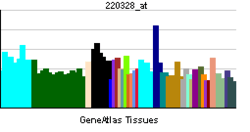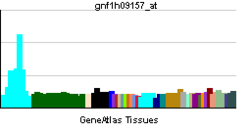PHC3
Polyhomeotic-like protein 3 is a protein that in humans is encoded by the PHC3 gene.[3][4][5]
References
Further reading
- Strausberg RL, Feingold EA, Grouse LH, et al. (2003). "Generation and initial analysis of more than 15,000 full-length human and mouse cDNA sequences". Proc. Natl. Acad. Sci. U.S.A. 99 (26): 16899–16903. doi:10.1073/pnas.242603899. PMC 139241
 . PMID 12477932.
. PMID 12477932.
- Ota T, Suzuki Y, Nishikawa T, et al. (2004). "Complete sequencing and characterization of 21,243 full-length human cDNAs". Nat. Genet. 36 (1): 40–45. doi:10.1038/ng1285. PMID 14702039.
- Beausoleil SA, Jedrychowski M, Schwartz D, et al. (2004). "Large-scale characterization of HeLa cell nuclear phosphoproteins". Proc. Natl. Acad. Sci. U.S.A. 101 (33): 12130–12135. doi:10.1073/pnas.0404720101. PMC 514446
 . PMID 15302935.
. PMID 15302935.
- Suzuki Y, Yamashita R, Shirota M, et al. (2004). "Sequence comparison of human and mouse genes reveals a homologous block structure in the promoter regions". Genome Res. 14 (9): 1711–1718. doi:10.1101/gr.2435604. PMC 515316
 . PMID 15342556.
. PMID 15342556.
- Gerhard DS, Wagner L, Feingold EA, et al. (2004). "The status, quality, and expansion of the NIH full-length cDNA project: the Mammalian Gene Collection (MGC)". Genome Res. 14 (10B): 2121–2127. doi:10.1101/gr.2596504. PMC 528928
 . PMID 15489334.
. PMID 15489334.
- Nousiainen M, Silljé HH, Sauer G, et al. (2006). "Phosphoproteome analysis of the human mitotic spindle". Proc. Natl. Acad. Sci. U.S.A. 103 (14): 5391–5396. doi:10.1073/pnas.0507066103. PMC 1459365
 . PMID 16565220.
. PMID 16565220.
- Deshpande AM, Akunowicz JD, Reveles XT, et al. (2007). "PHC3, a component of the hPRC-H complex, associates with E2F6 during G0 and is lost in osteosarcoma tumors". Oncogene. 26 (12): 1714–1722. doi:10.1038/sj.onc.1209988. PMC 2691996
 . PMID 17001316.
. PMID 17001316.
- Olsen JV, Blagoev B, Gnad F, et al. (2006). "Global, in vivo, and site-specific phosphorylation dynamics in signaling networks". Cell. 127 (3): 635–648. doi:10.1016/j.cell.2006.09.026. PMID 17081983.


 . PMID 12167701.
. PMID 12167701. . PMID 12477932.
. PMID 12477932. . PMID 15302935.
. PMID 15302935. . PMID 15342556.
. PMID 15342556. . PMID 15489334.
. PMID 15489334. . PMID 16565220.
. PMID 16565220. . PMID 17001316.
. PMID 17001316.